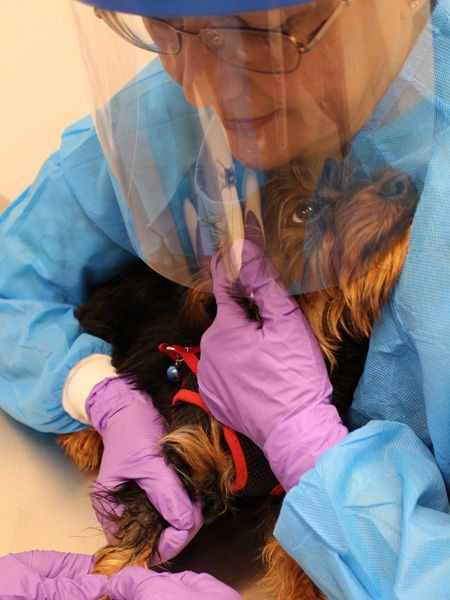 Why does my pet need to see a Board-Certified Veterinary Oncologist?
Why does my pet need to see a Board-Certified Veterinary Oncologist?
Medical Oncologists have a specialized knowledge and a high level of experience to provide the most innovative and compassionate care for your pet. Oncologists focus on diagnosing and managing cancer. At VSNT, we pride ourselves in our ability to treat the whole patient in the best possible manner through a team of dedicated specialists and technicians committed to caring for your pet with cutting-edge therapy and loving attention.
What should I expect during the visit with the Board-certified Veterinary Oncologist?
The Oncologist will perform a complete and thorough physical examination on your animal, and based on these initial findings, additional tests and treatment options will be discussed. Depending on your pet’s condition, diagnostic testing or management may include:
- Advanced laboratory testing of various blood or tissue samples
- Biopsies and tissue analysis
- Chemotherapy
- Ultrasound, radiography, CT scans, MRIs
- Immunotherapy
- Radiation therapy
- Surgery
Traditional and Innovative Treatment of Cancer
VSNT offers a wide variety of treatment options to fit each family’s goals, with quality of life in mind for each one. Our medical oncology treatments include both traditional and innovative options:
Oral chemotherapy
Intralesional
Injectable chemotherapy
Electrochemotherapy
Innovative intracavitary
Immunotherapy
When should you request a referral to an ACVIM Board-certified Veterinary Oncologist?
- Your pet has been diagnosed with cancer and you want to discuss all available treatment options
- Your veterinarian thinks your pet may have cancer but needs further diagnostic testing
- You want the most up to date cancer treatments for your pet with minimal side effects
- You want a specialist with many years of experience who treats nothing but cancer
- You want a specialist who will help coordinate your pet’s total cancer care with your veterinarian, the surgeons and the radiation oncologist
- You want veterinary technicians who have specialty experience administering chemotherapy treatments
Medical oncologists commonly treat the following types of tumors:
(not an all inclusive list)
Lymphoma (lymphosarcoma, LSA)
Lymphoma is a common tumor in dogs and cats. It is a malignant tumor of white blood cell origin. Normally, lymphocytes help fight infections by bacteria, viruses, and fungi as well as help our bodies prevent cancer. When the lymphocytes become cancerous, they are able to spread all over the body. Lymphoma commonly causes enlarged lymph nodes, and can be in all the major organ systems.
Mast cell tumors (MCTs)
Mast cell tumors are also fairly common tumors. They also originate from cells of the immune system. Mast cells are commonly found in allergic conditions. Evolutionarily, we suspect that mast cells were involved in immunity against parasites. These cells can become cancerous and make lumps or nodules in the skin, as well as occur in organs such as the spleen, liver, and bone marrow to name a few.
Melanoma
Melanoma is a malignant cancer of the pigment-containing cells (melanocytes) in the body. These tumors usually occur in the skin or mouth, and are often black in color. They can sometimes be other colors (amelanotic melanomas), so the color is not necessarily a conclusive diagnostic aid!
Hemangiosarcoma
Hemangiosarcomas are tumors of blood vessel origin. These tumors are extremely aggressive and may result in severe bleeding and death before you even know a patient has one. They tend to occur in internal organs such as the spleen, liver, and heart, but may also grow on the skin.
Transitional cell carcinoma
These tumors occur in the urinary tract, where they often cause blood in the urine (hematuria) or difficulty urinating (stranguria). They can also result in blockage of the urethra.

